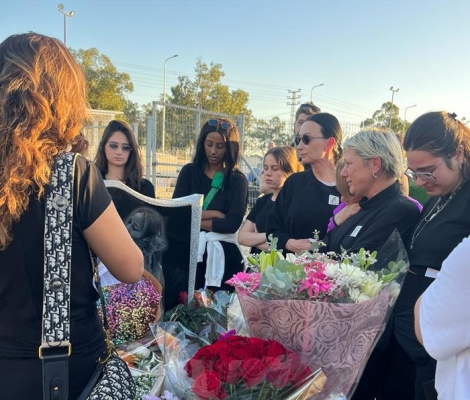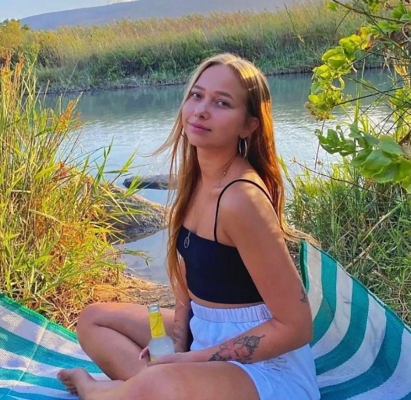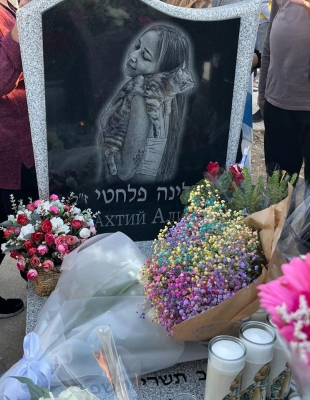Murdered by Hamas Religion and Burial
Alina Plahti was brutally murdered on 7 October at the NOVA festival in Re'im. But her story doesn't end with her burial; it begins there.
My daughter Sarit called on Shabbat. "Alina is missing."
I didn't get it at first. I don't think anyone realized how extensive the losses were then. How many had been at the festival. How many butchered. How many kidnapped. How many missing.
Alina was among the missing? I sat and stared at the TV. It was always on. I was numb and frightened.
I've known Alina's mother Olga for years through Sarit and her husband, Haim. Our whole family knows her because she worked for many years in Haim's business. My granddaughter Noa was devastated. She has known Olga and Alina almost her whole life. She bombarded social media with pictures of Alina and her boyfriend, Yonatan Eliyahu, who was later found murdered.
"Have you seen them?" The pictures all asked.
She posted a video of Yonatan calling to her as they were racing through the furrowed kibbutz fields. I reposted everything.
For three weeks Alina's parents and her brother, Ilya, waited for news. Was Alina in Gaza, or (better perhaps), already dead somewhere? Haim visited almost every day and brought them food, support and friendship.
But no one had seen them. No one saw them in videos being kidnapped to Gaza. It was becoming clear that Alina would be found only though the expertise of the forensics scientists and doctors who were overwhelmed by the enormity of trying to identify the bodies of hundreds of victims.
On the night of October 29, Alina's charred remains were finally identified.
I think that deep in our hearts, each one of us wonders how we would survive such a horrific tragedy. I've always felt — hoped — that when a bereaved soul is struggling with such an unbearable new reality and doesn't know how to carry on, doesn't know what to do next, our traditions of burial and shiva serve as a light. There is some comfort in knowing what is going to happen for the next week, at least — a framework to hold you up. Unless that, too, is taken from you.
Another phone call from my daughter:
"The religious council says Alina has to be buried outside the cemetery. I'm furious. I can't believe they are doing this to her."
I was just as furious and also ashamed. I could give all the reasons why Alina didn't deserve this slap in the face, but I shouldn't need to. I shouldn't have to enumerate or justify her right to a Jewish burial. Alina grew up in Israel, led as Jewish a life as any Israeli, served in the IDF, lit Shabbat candles, did "Hafrashat Challah" (Separation of the Challah), placed a mezuza on her doorpost. The only fact that mattered to the Beit She'an Religious Council was that Olga never had the correct papers to be considered Jewish.
"Why don't you check if Alina can be buried in a kibbutz in the area," I suggested.
"It's a good idea, but the family just can't wait any longer," Sarit said.
So, Alina, viciously murdered by Hamas terrorists, was laid to rest in a small section of the Beit She'an cemetery enclosed by a chain link fence with a narrow entry gate.
Sarit called me after the funeral almost in tears, sick from the humiliation and affront the family suffered at this "outside the fence" non-ceremony in Beit She'an.
"There were hundreds of people at the funeral. Mayor Jackie Levy and Alina's high school principal spoke. Then they started the procession to the grave, but the ceremony was over before we got through the crowded gate. It was a disgrace. There was nothing. No mourner's kaddish, no El Ma'aleh Rachamim. Nothing."
If that weren't enough, the official announcement from the Religious Council said that people were "invited to visit the family." Visit the family? The term "sitting Shiva" could not even be used.
But I used it and went to the Shiva the next day. Olga and I hugged and cried, and I sat down next to her in an area under their apartment building that the city had "walled in" with green burlap for some privacy.
We talked about Alina, and I told her how much Noa wanted to be there, which brought more tears. Noa had been inducted into the army the day before and couldn't leave her base. I saw Ilya's children, Alina's nephews. "The four-year-old doesn't understand why Alina doesn't come back," Olga said.
I wanted to apologize for the insult to injury they were suffering. Olga, usually tough and opinionated, now focused the bits of energy she had on getting through the next minute and the next.
In the meantime, my son-in-law Haim and mutual friends of Olga's from Kibbutz Shluchot who had also been at the funeral, were just as appalled at the disgraceful behavior of the Religious Council. They quickly took action to ensure there would at least be a Jewish ceremony to end the Shiva. They contacted Rabbi David Bigman, head of the Ma'aleh Gilboa Yeshiva, who shared their outrage. Along with members of Kibbutz Shluchot, Rabbi Bigman went to the family and the "visit of friends" became a true Shiva. They led prayers and Ilya recited Kaddish.
From there, as the saying goes, Alina's burial outside the fence went viral. Rabbis were outraged at the treatment. This included Rabbi Dr. Ido Pachter, coordinator of religion and state at Ne'emanei Torah Va'Avodah. When he heard the story, he told my daughter that he would make sure that Olga received an official apology. There was even talk of reburying Alina. But the family didn't want to go through another funeral.
What they did want was that no other family be subjected to the same shameful treatment they had received.
Rabbi Pachter arranged for Olga to speak at the Knesset's Aliyah, Absorption and Diaspora Affairs Committee. Apologies were now loud and plentiful coming from people like MK Oded Forer, chair of the committee, Yesh Atid MK Elazar Stern and Haim Amsalem, a former Shas MK.
After speaking to the committee, Olga was interviewed on radio and TV news shows. Two weeks after the burial, Rabbi Pachter and the family returned to the Beit She'an cemetery where a Jewish burial service was conducted. I saw this on a TV news segment. I also saw pictures of workers breaking down the wall between the sections of the cemetery. – but not completely. . It's still there but much lower.
I was there for the Shloshim. Alina's friends were all dressed in black but wore memorial stickers on their hearts with Alina's picture which made me smile. On the new low wall were planters with multicolored flowers. Some people carried Israeli flags.
I watched with tears in my eyes as Olga and the family stood next the new gravestone with Alina's image looking back at them. Rabbi Pachter conducted the service. He spoke of tearing down walls within our society and putting them where they belong – to keep the enemy out. He stepped closer to the grave and the family. "You are our sister. They will no longer put a fence between us and you."
Mayor Jackie Levy and MK Elazar Stern also spoke, each one apologizing to Alina for how she had been buried.
Ilya recited Kaddish and a wonderful man from Kibbutz Tirat Tzvi sang El Ma'aleh Rachamim.
Sarit and I stood with Olga back at the enclosed area by her house. I asked her how she was feeling now – after the media interviews, after the Shloshim.
"I just want to know that they understood my message," she said. "This shouldn't happen to other people."
I had heard her say that in interviews and she was still saying it. But I saw relief in her face now. Maybe because Alina is no longer separated from her People. Maybe because she knows that through Alina, walls are coming down.
We wrapped our arms around each other and didn't let go. I wondered why someone always has to die before there can be change.










Comments 4
Well written and heartfelt article - trying to right a major injustice in our society.
A well-written article about a remarkably bad situation. When religious ritual takes precedence over humanistic-moral values, I think that we have a serious problem. Galia Miller Sprung's ESRA article is especially shattering in the shadow of 07-October. Are we losing our sense of values?
Mel Farris
No more walls to separate us in life and in death. May her memory be a blessing
Heart braking in more ways than one!!